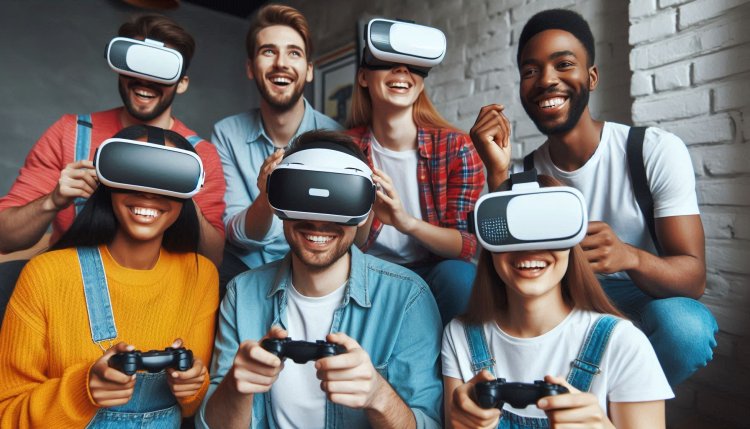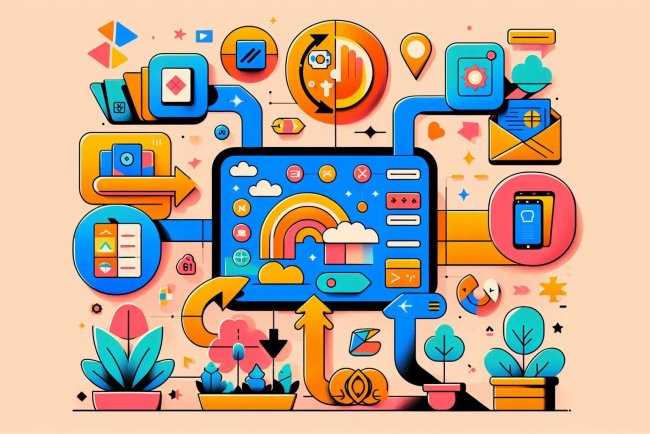Virtual Reality
"Explore a new world with Virtual Reality technology. Immerse yourself in immersive experiences and games like never before. Discover VR now!"

Virtual Reality
Virtual Reality (VR) is a computer-generated simulation of an interactive 3D environment that can be explored and interacted with by a person. It immerses the user in a completely digital world, often using head-mounted displays and other sensory input devices to create a sense of presence and allow for realistic interactions.
How Virtual Reality Works
VR works by presenting users with a computer-generated environment that they can explore and interact with in a realistic way. This is typically achieved through the use of specialized VR headsets that track the user's head movements and adjust the display accordingly to create a sense of immersion.
Other input devices, such as hand controllers or gloves, can also be used to interact with the virtual environment, allowing users to manipulate objects, navigate through the space, and engage with virtual elements in a natural way.
Applications of Virtual Reality
Virtual Reality has a wide range of applications across various industries and fields, including:
- Entertainment: VR is commonly used in gaming and entertainment to create immersive experiences for players. It allows users to step into virtual worlds and interact with characters and environments in a way that was previously not possible.
- Education: VR is increasingly being used in education to create engaging and interactive learning experiences. It can be used to simulate real-world scenarios, such as historical events or scientific experiments, allowing students to learn by doing.
- Healthcare: VR is being used in healthcare for medical training, therapy, and rehabilitation. It can help medical professionals practice surgical procedures, treat phobias and anxiety disorders, and aid in physical therapy for patients recovering from injuries.
- Architecture and Design: VR is used in architecture and design to create immersive walkthroughs of buildings and spaces before they are constructed. It allows architects and clients to visualize and experience a design in 3D, making it easier to make informed decisions.
- Virtual Tourism: VR can transport users to virtual destinations around the world, allowing them to explore and experience different places without leaving their homes. This can be especially useful for people with limited mobility or those looking to preview a travel destination.
Challenges and Limitations of Virtual Reality
While Virtual Reality offers many exciting possibilities, there are also challenges and limitations that need to be addressed:
- Cost: VR technology can be expensive, making it inaccessible to some users and organizations. The cost of high-quality VR headsets, computers, and other equipment can be a barrier to adoption.
- Health and Safety: Prolonged use of VR can lead to discomfort, motion sickness, and other health issues for some users. It is important to take breaks and use VR in moderation to avoid these potential side effects.
- Content Development: Creating high-quality VR content can be time-consuming and resource-intensive. Developers need to overcome technical challenges and design considerations to create compelling and immersive experiences.
- Privacy and Ethics: VR raises concerns about privacy and data security, as well as ethical considerations related to the use of immersive technology. It is important to address these issues to ensure that users' rights and well-being are protected.
The Future of Virtual Reality
Despite its challenges, Virtual Reality continues to evolve and expand into new areas. Innovations in hardware, software, and content development are driving the growth of VR technology and opening up new possibilities for its use.
As VR becomes more mainstream and affordable, we can expect to see it being used in a wider range of applications, from training and simulation to social interaction and communication. The potential for VR to transform industries and enhance our everyday lives is immense, and its impact is likely to continue growing in the years to come.
Virtual Reality represents a new frontier in human-computer interaction, offering unique opportunities for creativity, exploration, and connection in a digital world. By harnessing the power of VR technology, we can unlock new ways of experiencing and interacting with the world around us.
What's Your Reaction?

















